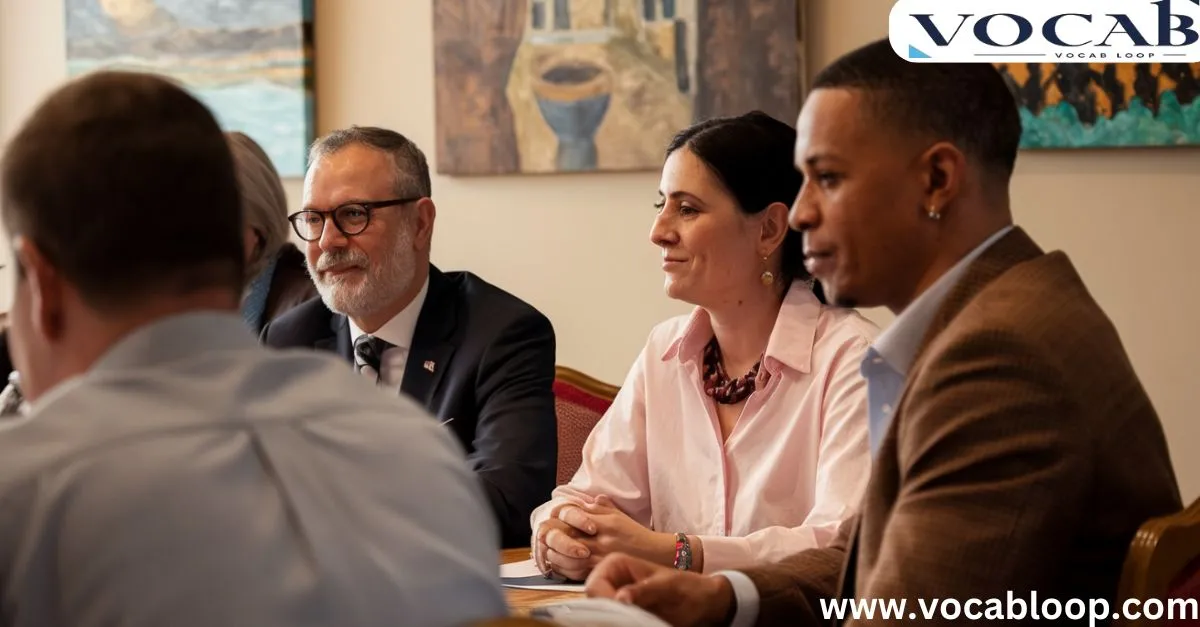The past tense of “meet” can be a bit tricky for English learners due to its irregular form. Instead of following the standard “-ed” ending, “meet” becomes “met” when referring to past events. Understanding this difference is key to accurately expressing when you encountered someone or something.
In this guide, we’ll explore how and when to use “met” correctly, along with pronunciation tips and real-life examples, so you can confidently talk about past meetings or encounters.
Is the Word “Meet” Correct?
The word “meet” is indeed a correct English verb. It means to come into the presence of someone or something, or to make the acquaintance of a person. Whether you say “meet” or “met” depends on the tense you’re using. “Meet” is the present tense form, while “met” is the past tense.
What Does the Word “Meet” Mean?

The verb “meet” has several definitions:
- To come into the presence of; to encounter: “I met the new neighbor in the hallway.”
- To join, unite, or come together at a point: “The paths meet at the garden gate.”
- To come into the company of; to become acquainted with: “I’d like you to meet my friend Sara.”
- To assemble or gather together: “The club meets every Tuesday evening.”
The past tense of “meet” is “met”, as in “I met my friend for lunch yesterday.” The past participle is also “met”, as in “I have met him before.”
When to Use Each Form
The bare infinitive “to meet” is used when speaking about the action of meeting in general: “I will meet him at the park tomorrow.”
The past simple “met” is used to talk about a specific meeting that happened in the past: “I met her for coffee last week.”
The past participle “met” is used in perfect tenses to indicate a past meeting: “I have met her several times before.” or “By the end of the year, I will have met all my new neighbors.”
Do You Say “Meet” or “Met”?
The key difference is that “meet” is the present tense form of the verb, while “met” is the past tense. You would use “meet” when referring to a current or future action, and “met” when referring to a past action.
How to Pronounce the Past Tense “Met”
The past tense of “meet” is pronounced as “met,” rhyming with “bet” or “let.” It’s important to clearly enunciate the “t” sound at the end to distinguish it from the present tense “meet.”
When to Use “Meet” vs. “Met”
In general, use “meet” when referring to an action happening now or in the future:
- “I meet my friend for lunch every Tuesday.”
- “Please meet me at the park at 3 o’clock.”
Use “met” when referring to a past action that has already occurred:
- “I met my new neighbor yesterday.”
- “The book club has met every month for the past year.”
Similar Verbs to “Meet”

“Meet” is an irregular verb, meaning its past tense form (“met”) doesn’t follow the standard “verb + -ed” pattern. Other common irregular verbs include:
- See/Saw
- Eat/Ate
- Go/Went
- Do/Did
Mastering these irregular verb forms takes practice, but understanding the patterns can help.
“Meet” in All the Tenses
| Tense | Verb Form |
| Present | meet |
| Past | met |
| Future | will meet |
| Present Perfect | have met |
| Past Perfect | had met |
| Future Perfect | will have met |
“Meet” in US vs UK English
There is generally no difference in the usage of “meet” and “met” between American and British English. Both forms are standard in all English-speaking countries.
Common Mistakes
Two common mistakes people make with “meet” and “met” are:
- Confusing the forms: Accidentally using “meet” when you mean “met,” or vice versa.
- Forgetting the irregular form: Trying to make “meet” into a regular past tense verb and saying “meeted.”
The Origin of “Meet”

The verb meet originates from Old English and is a word steeped in the linguistic traditions of Germanic languages. Its journey to modern English reflects both its practical use in describing encounters and its broader cultural significance.
Old English Roots
- The Old English word mētan meant “to come upon,” “to encounter,” or “to come together.” It conveyed the idea of two people or entities coming into contact, either intentionally or by chance.
- This term derived from the Proto-Germanic root mōtjaną, which also had meanings associated with meeting, assembling, or coming together.
Proto-Germanic and Indo-European Connections
- Proto-Germanic Influence: The word mētan is closely related to other Germanic languages:
- Old High German meizan (to meet, measure).
- Old Norse møta (to meet, encounter).
- Proto-Indo-European Roots: The deeper root for meet is thought to be med- or met-, meaning “to measure” or “to come together.” This reflects an early connection between meeting, measuring, and balancing, possibly derived from ancient practices of trade or negotiation.
Evolution in Middle English
- By the Middle English period, mētan evolved into meten, maintaining its core meanings. The usage expanded to include not just physical encounters but also metaphorical and social meetings, such as assemblies or agreements.
Cognates in Other Languages
- The German word mögen and Dutch moeten are loosely related, though their meanings diverged over time. These cognates highlight the shared linguistic heritage among Germanic languages.
Modern Usage
- The word meet has retained its original sense of encounter but has also broadened to include a wide range of meanings:
- Physical encounters: “I meet my friends at the café.”
- Assemblies or gatherings: “The team will meet to discuss the project.”
- Compatibility: “The new proposal meets our expectations.”
Synonyms of “Meet” and “Met”
“Meet” (Present Tense):
- Encounter
- Come across
- Run into
- Stumble upon
- Bump into
- Intersect
- Converge
- Assemble
- Gather
- Convene
“Met” (Past Tense):
- Encountered
- Came across
- Ran into
- Stumbled upon
- Bumped into
- Intersected
- Converged
- Assembled
- Gathered
- Convened
“Met” (Future Tense):
- Will encounter
- Will come across
- Will run into
- Will stumble upon
- Will bump into
- Will intersect
- Will converge
- Will assemble
- Will gather
- Will convene
Using “Meet” and “Met” in Everyday Conversations

“met” in the past tense:
- I meet my friend for coffee every morning.
- The book club meets on the first Tuesday of every month.
- Where do you usually meet your colleagues for lunch?
- John meets with the CEO once a week to discuss the project.
- The two business partners meet to negotiate the contract.
- Every Sunday, the community group meets to plan the upcoming events.
- Marie always meets her tutor after school to review her homework.
- The students meet in the library to study for their exams.
- Sheila meets with the wedding planner to finalize the details.
- The volunteers meet at the park to clean up the litter.
“meet” in the present tense:
- I met my friend for coffee this morning.
- The book club met last night to discuss the latest novel.
- I met my new neighbor when I was taking out the trash yesterday.
- John met with the CEO on Monday to provide an update on the project.
- The two business partners met last week to negotiate the contract.
- The community group met on Sunday to plan the upcoming events.
- Marie met with her tutor after school to review her homework.
- The students met in the library to study for their exams.
- Sheila met with the wedding planner last month to finalize the details.
- The volunteers met at the park to clean up the litter.
“met” in the future tense:
- I will meet my friend for coffee tomorrow morning.
- The book club will meet next month to discuss the new book.
- I will meet my new neighbors when they move in next week.
- John will meet with the CEO next Monday to provide an update.
- The two business partners will meet next week to negotiate the contract.
- The community group will meet this Sunday to plan the upcoming events.
- Marie will meet with her tutor after school to review her homework.
- The students will meet in the library to study for their exams.
- Sheila will meet with the wedding planner next month to finalize the details.
- The volunteers will meet at the park to clean up the litter.
FAQs
What is the difference between “meet” and “met”?
“Meet” is the present tense form of the verb, while “met” is the past tense form. You use “meet” to talk about an action happening now or in the future, and “met” to talk about something that happened in the past.
Is it “I met him” or “I have met him”?
“I met him” uses the past tense to describe a specific past event. “I have met him” uses the present perfect tense to indicate you’ve met him at some point in the past, but not necessarily at a specific time.
How do you pronounce the past tense “met”?
The past tense “met” is pronounced like the word “bet” or “let” – with a clear “t” sound at the end.
What are some common mistakes with “meet” and “met”?
The two main mistakes are confusing the present and past tense forms (using “meet” when you mean “met” and vice versa), and trying to make “meet” into a regular past tense verb by saying “meeted.”
Where does the word “meet” come from?
“Meet” comes from the Old English word “mætan” which meant “to encounter” or “to come together.” It has roots in ancient Germanic languages.
Conclusion
Mastering the past tense of the verb “meet” is an important part of English grammar. By understanding when to use “meet” versus “met,” learning the proper pronunciation, and familiarizing yourself with common usage examples.
You’ll be well on your way to confidently and accurately conveying the idea of encountering or joining together with someone or something, whether in the present, past, or future. With practice, this irregular verb form will become second nature.

Alex Hormozi is a seasoned blogger at Vocab Loop, known for his deep insights into language, vocabulary, and grammar. With years of experience in writing, Alex shares practical tips and effective strategies to help readers improve their linguistic skills and enhance their writing abilities.

